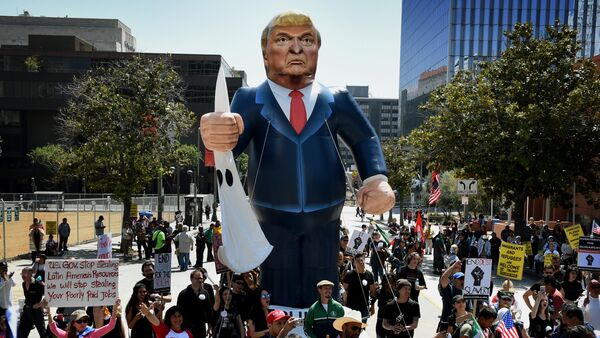The program, Deferred Action for Parents of Americans and Lawful Permanent Residents (DAPA), grants deferred action status to some undocumented immigrants who have lived in the United States since 2010 and have children who are either American citizens or legal permanent residents. It would allow eligible immigrants to get three-year renewable work permits and be exempt from deportation.
It was announced in 2014 as part of the expansion of the Deferred Action for Childhood Arrivals program passed by Obama as an executive action in 2012, which allowed some undocumented immigrants who arrived in the US before their 16th birthdays and before June 2007 to get renewable two-year work permits and be exempt from deportation.
The expanded amnesty was enacted by a series of memos from the Homeland Security secretary directing US Immigration and Customs to make aliens without criminal histories the lowest priority for removal and to grant deferred action to undocumented parents of citizens or lawful permanent residents.
Judge Andrew Hanen of Texas ruled that this violated the Administrative Procedure Act, saying as it was a major policy change, it should have been made available for public review and comment. Hanen issued a temporary injunction against launching the program in February 2015 while a case against its constitutionality, Texas vs. United States, was underway. The injunction was upheld by the US Supreme Court.
Now, both sides say Trump should have a voice in the case going forward.
"Given the change in Administration, the parties jointly submit that a brief stay of any further litigation in this Court before beginning any further proceedings would serve judicial efficiency and economy so that the parties have a better understanding of how they might choose to move forward," the sides said, according to the Washington Times.
"Accordingly, the parties respectfully submit that further proceedings on the merits of this case, including the submission of a schedule for resolving the merits, should be stayed until February 20, 2017," the Justice Department and lawyers for the state of Texas jointly requested Hanen, the Washington Times reported. Hanen will decide whether to pause the case or not.
Undocumented immigrants and their families in the US have been left in limbo by the election of Trump to the White House. Trump campaigned strongly on immigration, promising to build a wall between Mexico and the US, to deport millions of illegal immigrants and to strengthen border controls. He has promised to end what he calls the executive amnesties enacted by Obama and to end sanctuary cities, among other tough measures.
For the last several years, the National Immigration Law Center has encouraged all eligible immigrants to apply for DACA and DAPA. Now, until Trump's actual intentions are clear, the organization is recommending that eligible immigrants wait and see, the International Business Times reports. With DACA applications usually taking three months to process, new applicants wouldn’t necessarily have time to be approved by this administration, and would only be handing over crucial identification information to the next, potentially more hostile, administration.
"Generally speaking we think it's best to hold off on applying for the first time right now," Ignacia Rodriguez, policy advocate for the National Immigration Law Center, told the International Business Times. "They have to weigh the risks and benefits involved. Because there's so much uncertainty for what comes next, those applying have a higher risk for presenting information to immigration authorities that could be used against them."
As of July 2016, the US Citizenship and Immigration Services had approved 728,285 DACA applications, the Latin Post reported.
President Obama's administration has deported 2.5 million people, many more than any other American administration.





